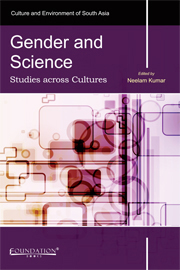Book contents
- Frontmatter
- Contents
- List of Contributors
- Acknowledgements
- Introduction: Reflections and Realities across Cultures
- Section I Approaches and Perspectives
- 1 Getting More Women into Science: Knowledge Issues
- 2 Gender Imbalance in Science: Cultural Similarities and Diferences
- 3 Gender and Technology
- 4 Gender, Science, and the Psychology of Science
- 5 Women and Minorities in Science: Discrimination and the Solution
- Section II Illustrative Examples
- Conclusion: The Persistent Patterns!
- Bibliography
- Index
2 - Gender Imbalance in Science: Cultural Similarities and Diferences
from Section I - Approaches and Perspectives
Published online by Cambridge University Press: 05 May 2013
- Frontmatter
- Contents
- List of Contributors
- Acknowledgements
- Introduction: Reflections and Realities across Cultures
- Section I Approaches and Perspectives
- 1 Getting More Women into Science: Knowledge Issues
- 2 Gender Imbalance in Science: Cultural Similarities and Diferences
- 3 Gender and Technology
- 4 Gender, Science, and the Psychology of Science
- 5 Women and Minorities in Science: Discrimination and the Solution
- Section II Illustrative Examples
- Conclusion: The Persistent Patterns!
- Bibliography
- Index
Summary
This chapter proposes to discuss the relationship between culture, gender, and science. It brings together empirical findings, associated debates, and research to offer an account of the relationship giving examples from various parts of the world. With the help of a review of extant literature on women's access and participation in science, the chapter tries to identify certain similarities and differences across cultures. Culture is an elusive concept. Culture as a way of life gives meaning to things we do, including science, and pervades all social institutions and systems of meanings. Inextricably bound with these societal systems is gender. Out of the social structure and culture, gender and its boundaries are fabricated, which always involves difference and inequality. The recent integrative approach treats gender as a socially constructed stratification system and does not stress the role of biological compulsions like the earlier ones. The feminist perspectives are of special help in changing how we understand the role of social interactions with biological sex differences in shaping feminine and masculine characteristics. Science too is one of the social and cultural realities. Science is a social construction and cultures differ in terms of social processes – thus social processes of science are assumed to differ across cultures. According to the simple syllogistic rule, the consideration of two premises – science is a social construction and cultures differ in terms of social processes – leads to the conclusion that social processes of science differ across cultures.
- Type
- Chapter
- Information
- Gender and ScienceStudies across Cultures, pp. 20 - 36Publisher: Foundation BooksPrint publication year: 2012
- 1
- Cited by

